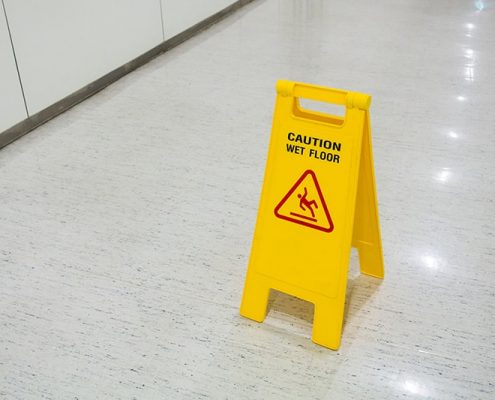Hospitals owe patients a duty of care while the patient is under their care. The Agency for Healthcare Research and Quality, a division of the U.S. Department of Health and Human Services, has determined that certain events are “Never Events” because they should never happen. Such events are usually preventable, identifiable, measurable, and may result in serious injury or death.
Slips and falls are on the list of Never Events. When a patient falls, it is a reportable event. A few years ago, falls were killing about 11,000 people a year in hospitals and up to a million were falling. Due to the implementation of fall prevention protocols in hospitals like the Center for Disease Control’s STEADI program, those numbers are dropping. But the right number is zero.
Factors that contribute to falls include poor lighting, slippery floors, loose carpets or wires, broken steps, uncleared snowy or icy sidewalks, slippery accumulations of leaves, broken handrails, and clutter.
Patients should be assessed for things that put them at risk of falling including weakness, fatigue, neurological disorders, and blurry vision.
Providing non-slip footwear can prevent patient falls.
Litigation involving patient falls in hospital lawsuit can involve malpractice if clinical staff, such as when doctors, nurses, and physical therapists failed to do their job to keep the patient safe. The specific responsibilities a hospital has to safeguard patients against falls is documented in two ways. The first relate to industry standards that are applicable to all hospitals. Protocols in hospitals are highly regulated and failure to follow industry practices can be considered malpractice.
In addition, the hospital will have policies and procedures. Failure to follow internal procedures can be evidence of negligence in patient falls in hospital lawsuit cases.
A fall can also be negligence attributable to the property owner that is not medical malpractice. Owners are responsible for maintaining the property in a safe manner. If a physical element of the property, such as loose strings on the carpet, caused the fall they may be responsible under negligence laws.
Hospitals are obligated to maintain a safe environment for patients and visitors. If liquids spill, they must clean them up quickly to prevent falls. If a patient who needs assistance to use the bathroom calls for help, the staff must respond quickly so the patient doesn’t attempt to make it on their own. This means the hospital must maintain adequate staff so their employees can respond in a timely manner.
Falls are the number one cause of injury to hospital patients.
 Throughout the patient’s stay in the hospital, industry protocols require staff to assess the fall risk and take appropriate action to manage the patient’s risk of falling. This assessment should be ongoing because changes in the patient’s condition can further impair mobility and medications can affect their stability or memory.
Throughout the patient’s stay in the hospital, industry protocols require staff to assess the fall risk and take appropriate action to manage the patient’s risk of falling. This assessment should be ongoing because changes in the patient’s condition can further impair mobility and medications can affect their stability or memory.
It is possible that a noncompliant patient will have contributory negligence because they didn’t request assistance when getting out of bed after being told to get assistance first. Fall precautions are taken for a reason. Falls can cause broken hips, traumatic brain injuries, and other disabling and life-threatening injuries.
While it is important to properly train the cleaning crew, it is equally important to have policies that require every employee contribute to maintaining a clean and safe environment. Every employee should be attuned to tripping hazards or fluids that could cause someone to slip and know to take action to immediately rectify the hazardous situation.
In either type of situation, liability can come into play if they did not take steps to prevent a foreseeable injury. If they knew, or should have known about the risk, and failed to act to prevent your injury, they may be liable.
If you or a loved one suffered a serious injury from a fall in a hospital as a patient, visitor, or employee, you should consult a slip and fall lawyer to discuss the circumstances surrounding the fall. Falls are a specific type of injury that require a knowledgeable attorney to protect your interests.
An injury attorney in Las Vegas will help you determine whether to file the claim as a medical malpractice case as the result of negligent nurses or systematic issues in the organization such as understaffing, improperly trained staff, poor communication protocols or a culture that doesn’t give patient safety the attention it deserves.